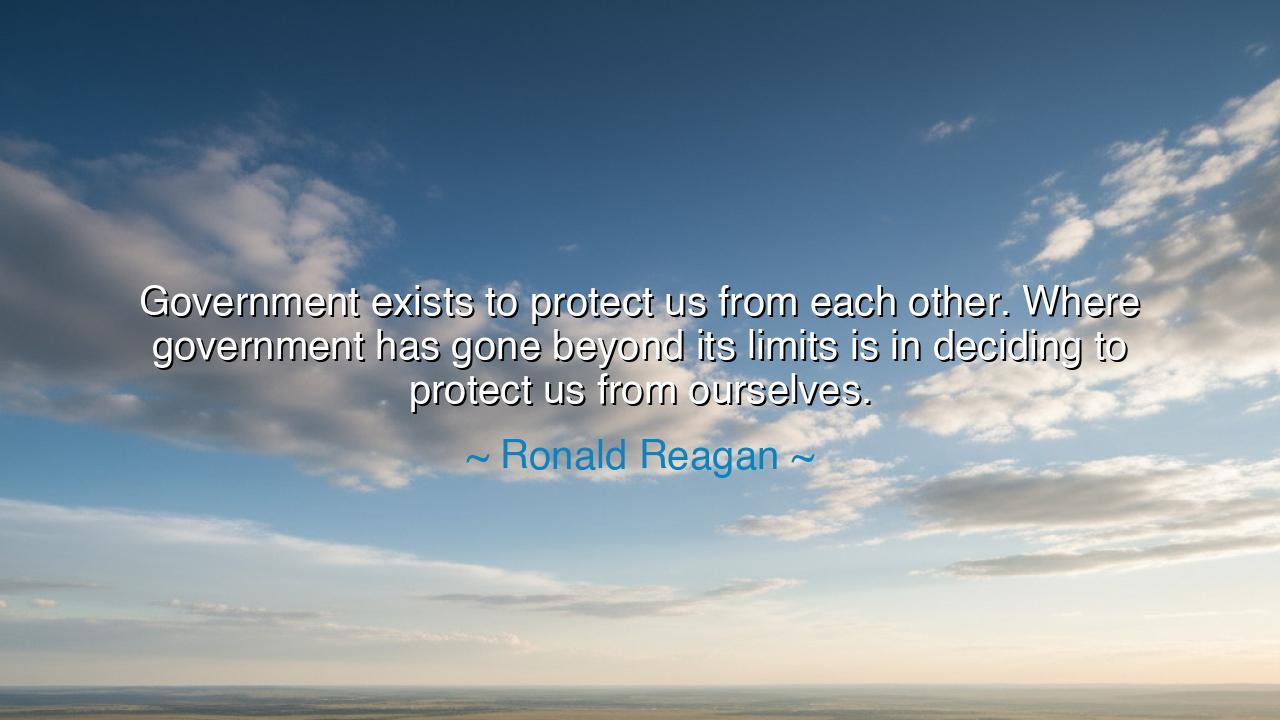
Government exists to protect us from each other. Where government
Government exists to protect us from each other. Where government has gone beyond its limits is in deciding to protect us from ourselves.






The words of Ronald Reagan resound with the solemn clarity of ancient wisdom: “Government exists to protect us from each other. Where government has gone beyond its limits is in deciding to protect us from ourselves.” This statement is more than a critique of power—it is a meditation on freedom itself. It speaks to the eternal tension between liberty and control, between the protective hand of authority and the untamed spirit of the individual. Reagan, born of the storms of the twentieth century, had witnessed both the promise and peril of government power. His words remind us that while order is necessary for peace, too much order can suffocate the human soul.
In its truest form, government is meant to be a guardian, not a master. Its sacred purpose is to maintain justice, protect property, and ensure that one man’s freedom does not become another’s chains. This was the vision of the Founding Fathers, who shaped the Constitution not as a weapon of control, but as a shield of restraint. They understood that mankind’s greatest achievements arise not from compulsion, but from the freedom to choose—to succeed, to fail, to learn, and to rise again. The government’s duty, therefore, is to preserve the conditions in which freedom can flourish, not to dictate how it must be lived.
Reagan’s words emerged in an age when the state had begun to extend its reach into every corner of life—telling citizens what they could eat, drink, smoke, build, or believe. In his view, this was the moment when the protector had become the warden. The idea of government “protecting us from ourselves” may sound benevolent, but beneath its surface lies a quiet erosion of personal responsibility. To save us from our own errors, it must first assume that we are incapable of self-governance—and once that assumption is accepted, liberty begins to fade.
History offers many examples of this slow transformation. Consider the Prohibition era of the 1920s, when the U.S. government sought to save its people from the “sin” of alcohol. With good intentions, it outlawed the sale and consumption of liquor, believing it would reduce crime and moral decay. Yet the opposite occurred: a vast underground economy was born, corruption spread through every level of law enforcement, and citizens who once trusted the law came to mock it. When the government tried to protect people from themselves, it unleashed chaos instead of virtue. The lesson was clear: morality cannot be manufactured by decree—it must grow from conscience.
Reagan’s warning is not against laws or governance itself, but against paternalism, that subtle tyranny that disguises itself as care. A free society cannot thrive when its citizens are treated as children, incapable of choice. The greatness of democracy lies in its willingness to let people stumble, to let them face the consequences of their actions, and through that struggle, to grow wiser. For if the government shields every man from the weight of his own decisions, it also denies him the dignity of learning and the strength of self-mastery.
This quote also speaks to a deeper truth about human nature: that freedom is inseparable from risk. To live freely is to accept that one may err. The government can protect you from the thief, but not from temptation; it can guard your home, but not your heart. The boundary between protection and control must therefore be fiercely defended, for when it blurs, men cease to be citizens and become subjects. Every empire that has fallen into tyranny began with rulers who claimed to know better than the people what was good for them.
The lesson of Reagan’s words is both simple and eternal: freedom demands responsibility. The power of self-determination must be matched by the wisdom of self-restraint. A nation of free men must learn to govern their own impulses before demanding governance from above. If we lose this balance, we trade the majesty of liberty for the comfort of obedience—and in doing so, we betray the very purpose of government itself.
Therefore, let every man and woman remember this: guard your freedom as you would guard your life. Question the hand that offers safety at the cost of choice. Teach your children that to be free is not to be without rules, but to be ruled by conscience rather than compulsion. For as Reagan reminded us, the purpose of government is to protect, not to parent, and the highest form of protection is to preserve the liberty of the human spirit.






AAdministratorAdministrator
Welcome, honored guests. Please leave a comment, we will respond soon